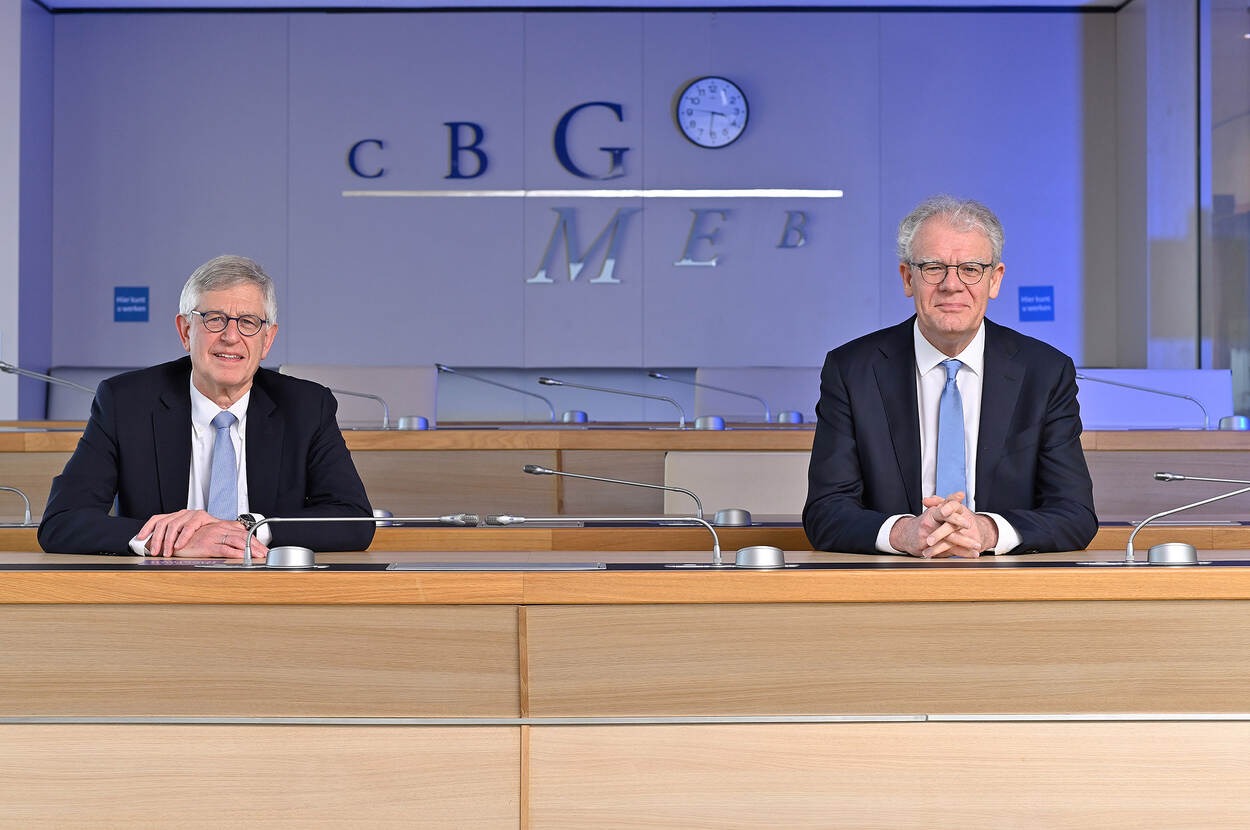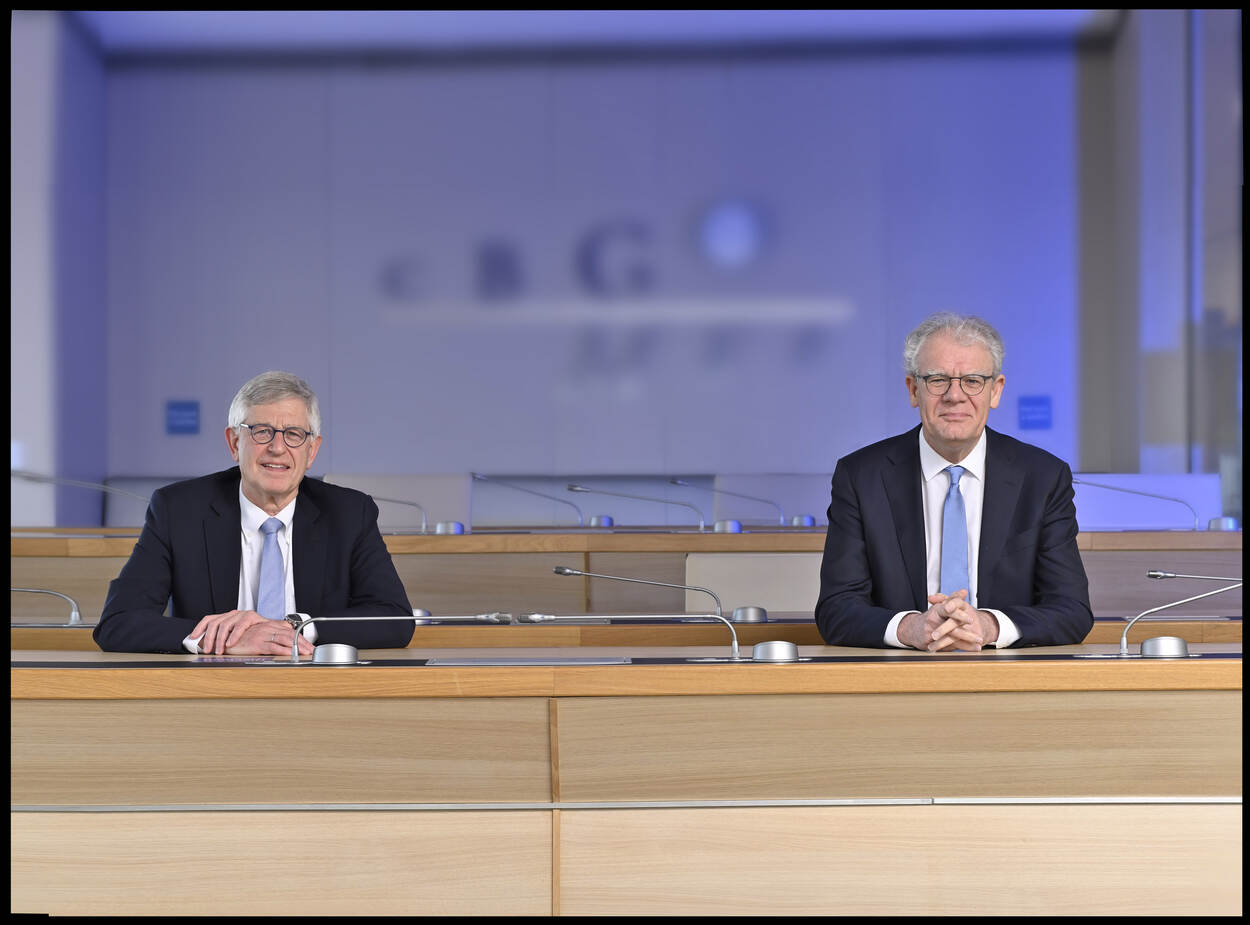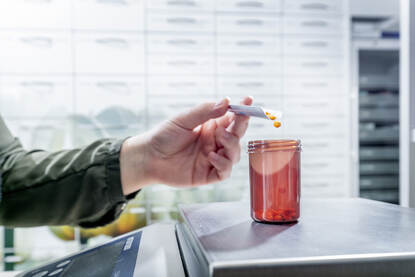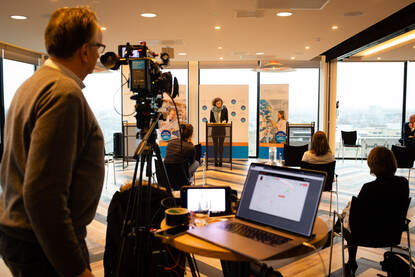The COVID-19 pandemic left an indelible mark on 2020. It would be a year in which everything changed, but in which, quite paradoxically, our regular work also continued in full force. Chair Ton de Boer and Director Hugo Hurts look back on 2020 – the year of coronavirus – together.
Everything changed, everything continues – with a new perspective
“Whether you call it a special, bizarre, unprecedented or unique year: no cliché really encompasses everything that has happened since March 2020. The global COVID-19 pandemic has had repercussions on the whole of society, including the work and working methods of the MEB,” Hugo explains. “Almost all MEB staff worked from home most of the year. Consultations, meetings and gatherings were and continue to be held online. There are pros and cons to that. On the one hand, the meetings generally work well. But on the other hand, it does cause problems,” Hugo realises all too well. “Although the MEB has embraced time and location-independent working for a number of years, we did see our people facing challenges. For example, poorly equipped workstations at the kitchen table or in bedrooms. Long days sitting at the computer, no direct interaction with colleagues, home-schooling young children: the working conditions were far from ideal. Where possible, we tried to support employees as an organisation, by authorising special leave where it was needed, providing home office equipment or other ways of making the situation a little more workable. But it is impossible to eliminate all inconveniences.”
It was very quiet in the building in Utrecht in recent months. “Our lecture hall, where we hold biweekly meetings with the Board and where agency assessors also come to provide explanations, seats sixty people. But in the last few months, each time I was there with just a few others and we talked to everyone else through the screen,” Ton explains.
A lot of work done from home
The productivity of the Board and the agency was not affected anyway. “A huge amount of work was done. We basically operated in a continuous crisis mode starting in March. I am extremely proud of the MEB staff, who worked incredibly hard in spite of the situation, not just on our regular work, but also on all the activities that resulted from the situation, coordinated by the COVID-19 crisis team,” says Hugo.
This involved various aspects related to medicines and vaccines for COVID-19. “In April, we started offering special scientific advice free of charge to research groups in hospitals, startups and small businesses,” says Ton. “We would hate to see a brilliant idea go to waste or research take longer than necessary because of problems with the study design.”
Looking back, we reviewed countless dossiers on COVID-19 and other topics in 2020. “Ultimately, this led to a positive recommendation on two medicines – first remdesivir and later dexamethasone – that benefited COVID-19 patients,” Ton summarises. “And the development of vaccines, which in itself has been done in record time, led to the initiation of multiple assessment procedures throughout the year. For the first time, we did so in an accelerated procedure called a rolling review. AstraZeneca’s COVID-19 vaccine was the first to enter that route in October, followed by the Pfizer/BioNTech and Moderna vaccines. Assessors were able to look at all the study results as soon as they became available at a record pace.”
Positive vaccine recommendation
Thanks to all of this hard work, we were able to conclude 2020 with a significant milestone: the positive recommendation by the European Committee for Medicinal Products for Human Use (CHMP) on the Pfizer/BioNTech COVID-19 vaccine. Ton: “A historic moment, for us as well as for the Netherlands and the rest of Europe. For the first time in the MEB’s history, we seized the moment to convene a press conference to provide the media and the general public with an explanation of the assessment process, the considerations involved and the quality, efficacy and safety of the vaccine.”
Hugo believes this was a logical step, given the intense media coverage of the COVID-19 pandemic: “We have increasingly seen the general public finding their way to us in recent years, and the COVID-19 situation has accelerated this in an unprecedented manner. There has been a great need for information, and in addition to our primary task of assessing and monitoring medicinal products and vaccines, providing the right information and helping to improve confidence in those products is especially important now.”
This sharing of information took place at various times. In addition to the press conference about the first COVID-19 vaccine, this was done through various appearances in the media. Besides Ton, assessors such as Leonoor Wijnans and Ingrid Schellens also made frequent media appearances, in newspapers and on radio and television programmes. “Yet another special occasion for the MEB was the television broadcast of our own Grootste Coronaspreekuur (‘Great COVID Consultation Hour’) in early November, in which both MEB and external experts answered numerous questions from the general public. Never before has the MEB had such great social exposure.”

Financial Affairs
The virus has also clearly had an impact on the MEB’s financial situation. “Halfway through the year, our organisation seemed to be heading for a financial surplus,” Hugo explains. “The MEB had a high workload even before the COVID-19 pandemic. In order to tackle this and to cope with the extra workload related to COVID-19, additional investments were made in employees and external hiring. Along with several other factors, this ended up leading to a slightly negative year-end result after all.”
One of these factors was a sizeable financial provision in the financial statements due to leave not taken in 2020. Hugo: “On the one hand, travel restrictions made it difficult to enjoy taking time off in the usual way. But on the other hand, of course, MEB staff also worked incredibly hard all year. We hope to see things start to return to normal in 2021, for the sake of everyone’s health and well-being.”
Impurities
Looking back, it is easy to forget that there was more than COVID-19 and all of the activities associated with COVID-19 vaccines and medicines. “But there most certainly was more,” Ton and Hugo respond. “All of our regular work also continued in full force, as did situations completely unrelated to the COVID-19 pandemic. Impurities in medicines are an example of this.” Back in 2018, several angiotensin receptor blockers, called sartans, were found to be contaminated with nitrosamines. Ton: “This issue returned to our agenda in 2020, starting with a recall of ranitidine-based antacids in which the impurity was found. This was followed by an investigation into metformin, a medicine for people with type 2 diabetes, which was also found to contain nitrosamines. It led to much international consultation, advice and a number of recalls. There was also some concern in the media about possible impurities in paracetamol. But following extensive analysis, these concerns turned out to be unfounded.”

Shortages
Medicine shortages have been a hot topic in recent years. Ton: “Last year, in the annual report of the Medicine Shortages and Defects Notification Centre, which we coordinate together with the Health and Youth Care Inspectorate (IGJ), we reported that there were twice as many notifications of expected supply problems compared to 2018 . Although the number of notifications also increased in 2020, this increase was significantly smaller than in the previous year. The increase amounted to about 6%, concerning 2,079 different medicines in practice.”
A notification does not necessarily mean that there will indeed be a shortage. “Companies are required to notify the MEB of an anticipated supply interruption at least two months in advance. We then investigate whether a shortage of the medicine will occur, and if so, whether there is a solution to prevent this shortage,” Ton explains.
“The COVID-19 crisis created all sorts of logistical challenges. There were also signs of reduced production due to lockdowns in some manufacturing countries,” Hugo adds. “From that point of view, we shouldn’t be unhappy with such a levelling off of the increase. Especially when you consider that for almost all supply problems in 2020, a solution was eventually found in the form of an alternative medicine.”
When the COVID-19 pandemic started, there was uncertainty and concern about possible shortages, ranging from OTC medicines to medicines for treating COVID-19 patients in hospital ICUs. Hugo: “Due to hoarding, supplies of some medicines in community pharmacies and chemists sold more quickly than usual, for example paracetamol. Pharmacies and chemists then temporarily limited the number of boxes of paracetamol per customer. These and other efforts helped prevent shortages of COVID-19-related medicines. There were no major availability problems. We will, of course, continue to closely monitor international developments.”
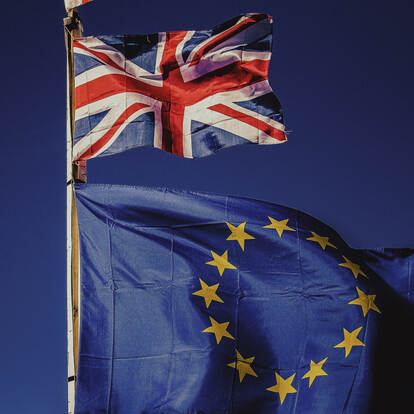
Brexit
The year 2020 also marked the United Kingdom’s departure from the European Union. A transition period began on 31 January and ended on 31 December 2020. “We incorporated all the Brexit-related projects and activities in one programme in order to be well prepared for the changes and to ensure continuity,” says Hugo. “The priority was always to minimise the consequences of Brexit for patients. Brexit meant a massive redistribution of work for products in both centralised and decentralised European procedures. Because of Brexit, the United Kingdom was no longer allowed to take a leading role in European procedures at all in 2020, but was still involved in ongoing procedures.”
International collaboration
One of the MEB’s initiatives to fill the gap created by Brexit is the International Collaboration Program (ICP). “We started this in 2017, but really saw it take off in 2020. Sharing our knowledge and experience with other agencies enables the network to work much more efficiently and more collaboratively,” Hugo observes. “We have seen this clearly in the past year. Look at the work on decentralised procedures, for example, which we have been able to share with several collaborative partners from the ICP, and also consider the MNATs, the multinational assessment teams in which several countries carry out assessments together. This has taken off in a big way thanks to our ICP network.”
Attributable partly to COVID-19, there was a similar increase in further collaboration at the European and international level. “For example, the frequency of meetings of the International Coalition of Medicines Regulatory Authorities (ICMRA) was greatly increased from a few times a year to biweekly. In addition, the Heads of Medicines Agencies (HMA), also aimed for more flexibility during the pandemic,” outlines Hugo. “And above all, direct collaboration between the European Commission, the European Medicines Agency EMA and the medicines agencies of the member states intensified significantly.” The Netherlands’ prominent role in Europe was also reinforced in 2020, Hugo adds. “With Emiel van Galen as the new chair of the EMA’s Committee on Herbal Medicinal Products (HMPC) and Kora Doorduyn elected to the same position for the Coordination Group for Mutual Recognition and Decentralised Procedures - human (CMDh), our leading role in key European committees has been further enhanced.”
National collaboration
In the Netherlands, collaboration with stakeholders was further expanded and ties were strengthened. Hugo mentions industry associations such as BOGIN (the Dutch generic and Biosimilar medicines association) and VIG (the association for innovative medicines in the Netherlands), and of course the National Health Care Institute (ZIN), with which the pilot for parallel procedures was continued. In addition, several collaborative partnerships were formalised. Ton: “We have worked with the Dutch Working Party on Antibiotic Policy (SWAB) for some time, to coordinate medicine information and the use of antibiotics and other anti-infective agents as closely as possible. Contacts between SWAB and the MEB have been built up and expanded in recent years, and this year we formalised this collaboration.”
The same applies to the collaboration with the Royal Dutch Pharmacists Association (KNMP). Hugo: “The KNMP has been an essential partner of the MEB for years when it comes to the proper and safe use of medicines by patients. Supported by the Ministry of Health, Welfare and Sport, we also formalised our collaboration with them, giving us a solid foundation for exchanging information and making working arrangements.” One of the results of the collaboration in 2020 was Medicine in Short, easy-to-understand, summarised information about medicines on a single A4 page, complementing the patient information leaflet.
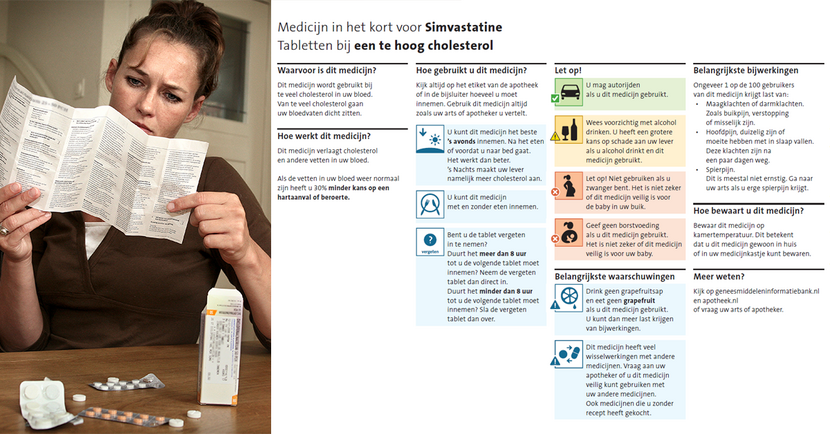
Veterinary Medicinal Products Unit
The MEB’s Veterinary Medicinal Products Unit did not stand still in 2020 either. And there too, the focus was emphatically directed outward. “Preparations for the two new European regulations for veterinary medicines and medicated feeds are really taking shape now. As these regulations will come into effect in January 2022, a lot of time and attention is still needed for preparation,” Hugo explains. “The Veterinary Medicinal Products Unit is working closely with the Ministry of Agriculture, Nature and Food Quality (LNV) to ensure that the implementation proceeds as smoothly as possible. This will enable us to play a role at crucial points in the European development process for important new systems, such as an efficient European product database for veterinary medicines, and to help reduce administrative burdens in the future. All in all, an essential start was made in 2020 to move forward at full strength in 2021.”
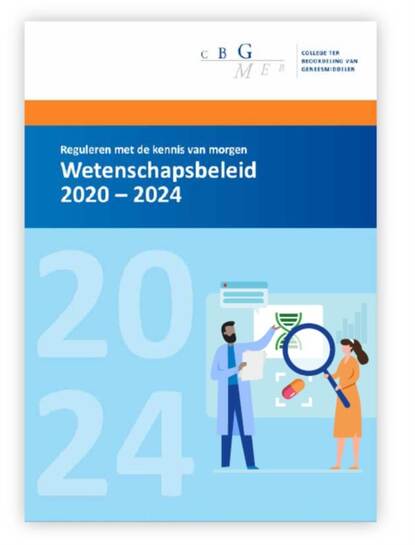
Reinforcement of scientific foundations
The new scientific policy plan for which the foundations were laid in 2019 was further developed in 2020. This resulted in the Science Policy 2020–2024, which ties in with the Strategic Business Plan 2020–2024. Ton: “The science policy has defined eight themes that require intensification in the Regulatory Science domain in the coming years. We need to find a regulatory response to the developments within these themes together with our fellow regulatory authorities. Examples include other forms of treatment, a more personalised approach to health, and changing legislation, guidelines and procedures. The developments force our organisation to continuously scrutinise our own assessment system and improve it.”
“In 2021, we will develop the policies into an Implementation Plan, which will describe even more specifically how we intend to implement the policies in the coming years. As an organisation, we believe it is very important that our scientific activities benefit our statutory tasks and the regulatory system as a whole. We are therefore excited to be able to use the science policy to clarify, for ourselves and for the outside world, how the MEB is investing in the field of Regulatory Science.”
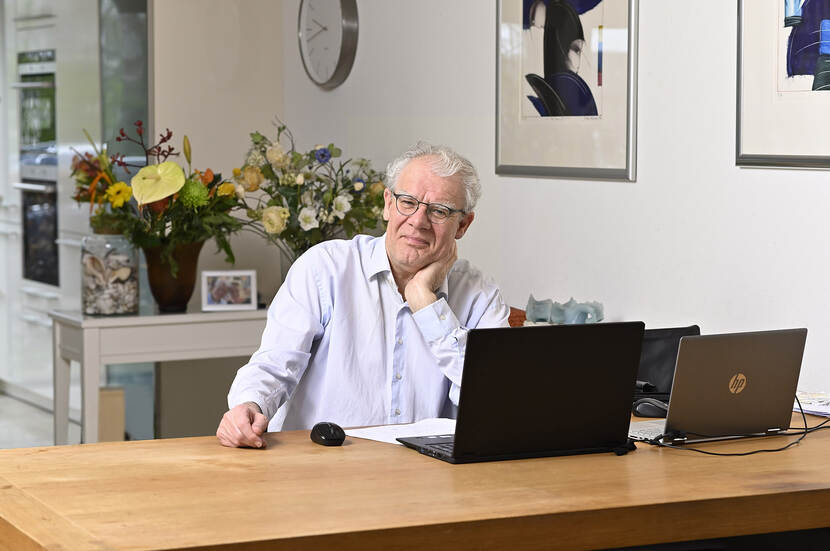
Internal developments
As if all the external developments were not enough, there was a lot going on internally as well. The MEB is looking ahead. In the coming years, the agency plans to make its organisational structure more robust by establishing a divisional structure. “This should provide a broader management structure with clearer lines and a more even span of control. Therefore, at the end of 2020, we started the so-called Trailblazer structure ('Kwartiermakersorganisatie', KMO) as a way of gaining experience with that way of working. Although the creation of the QMO was met with ups and downs, we hope to get a lot out of it for the future design of the organisation,” said Hugo.
2020 was also a memorable year on the IT front. “Our Information Provision Unit worked incredibly hard,” Hugo explains. “We completed a migration of all of our servers and data systems to a new location, including the transfer of their management to an external provider. It was a huge undertaking that took years of preparation, which coincided with an already extremely busy period for the entire organisation. The transition went very smoothly in the end, a result to be proud of.”
New perspective
“All in all, 2020 was a year of many developments, also apart from the tremendous impact of COVID-19,” Ton and Hugo conclude. “We can therefore talk about a new perspective from several angles: in how we work together, in how we are seen as an organisation by the outside world, and in the perspective we will grow towards in the coming years.”
